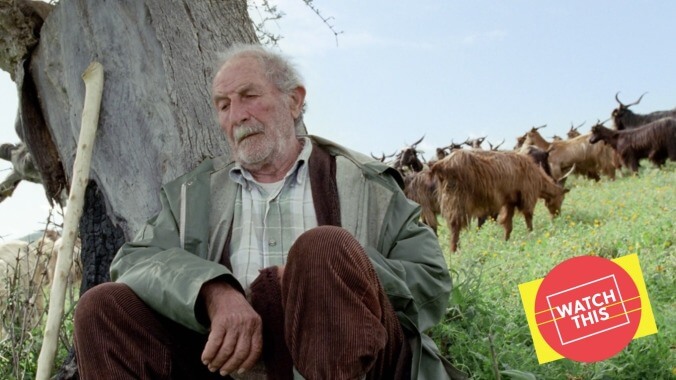Reincarnation is the subject of this playful, wordless wonder

Watch This offers movie recommendations inspired by new releases, premieres, current events, or occasionally just our own inscrutable whims. This week: Shhhhhh! We’re celebrating movies with little to no dialogue.
Le Quattro Volte (2010)
There’s not a single line of direct, significant, or discernible dialogue in Le Quattro Volte. The film, whose title translates in English to The Four Times (though it’s rarely referred to that way, even in America), isn’t literally wordless: We hear human voices during scenes of big gatherings in the small, secluded town of Caulonia in Southern Italy. But what the people are saying doesn’t matter—it’s crowd noise, not conversation, as pointedly abstract as the bleats of livestock granted as much screen time as their bipedal costars. The story being told here is so primal and simple, a feature-length illustration of a spiritual principle, that any dialogue would be unnecessary; we can get the gist of the film’s arc through its imagery alone. Plus, the absence of spoken language reinforces a philosophical democracy: In the grand design of the movie—and, by extension of its viewpoint, the planet—humans are no more important than animals, plants, or minerals.
Those are the four stages (or times, if you will) depicted in Le Quattro Volte, which gradually reveals itself to be a transmigration tale. We meet the main character, silent save for a persistent hacking cough, at the end of his life. He’s an unnamed shepherd (Giuseppe Fuda) suffering from an unidentified ailment that he treats with a mixture of water and the dust he collects from the floor of the local church. Just as writer-director Michelangelo Frammartino appears to be settling into the rhythms of a portrait of old age in an old world, the man’s superstitious home remedy fails him. But is death the end of his story? It’s when Le Quattro Volte switches to the perspective of a newborn lamb, starring in its own perilous survival yarn, that we come to understand that we’re witnessing a soul in transition—a journey that includes a tenure as flora, and then some time in an even less animate form that brings the film full circle.
Without irony, you could call Le Quattro Volte spiritual, not religious. It draws that distinction through parallels, presenting denominational rituals (including a town passion play of sorts) alongside its own implied reincarnation narrative, as if to suggest that Christian dogma may overcomplicate what is, in reality, just a natural passage from one physical state to the next. Looked at another way, the movie is just demonstrating the circle of life, placing humanity in an ecosystem of entwined consumption and recirculated matter. Either way, Frammartino approaches his big existential material with not just a quiet awe beyond what words could express but also a certain playfulness, even a lightly comic touch. There is, for example, a single-take sequence involving a dog, a truck, and a historical reenactment that recalls the meticulously orchestrated physical comedy of Jacques Tati. The magic of the film is how it resists explicitly explaining the mysteries of life and death, even as it comfortingly asserts that one is just a step (and maybe not the final one) within the other. Bafflingly, Frammartino hasn’t made a movie since. Maybe he said all he needed to say here, plainly and without characters who say anything.
Availability: Le Quattro Volte is currently streaming on The Criterion Channel.